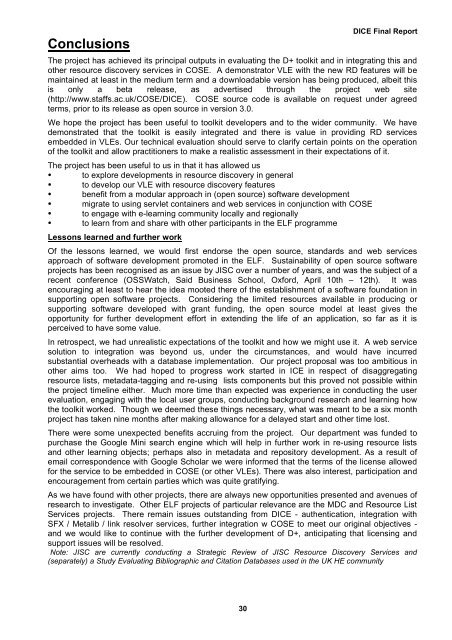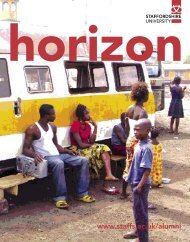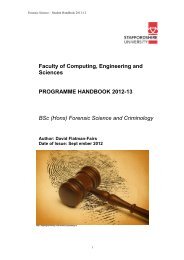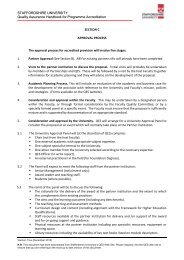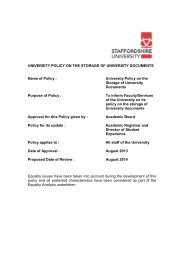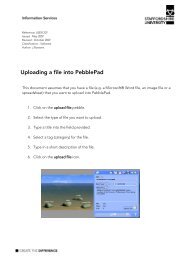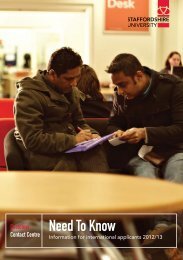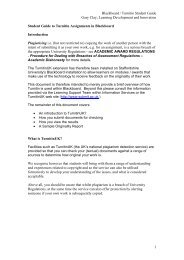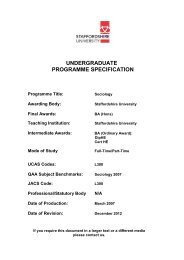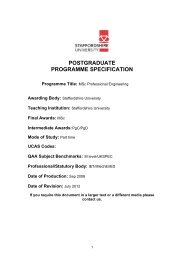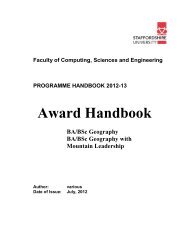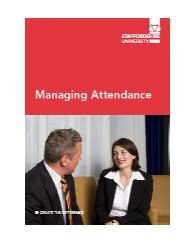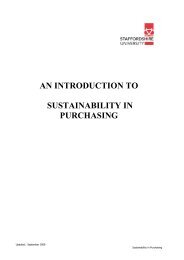DICE Project Final Report Resource Discovery Tools Evaluation and ...
DICE Project Final Report Resource Discovery Tools Evaluation and ...
DICE Project Final Report Resource Discovery Tools Evaluation and ...
You also want an ePaper? Increase the reach of your titles
YUMPU automatically turns print PDFs into web optimized ePapers that Google loves.
Conclusions<br />
<strong>DICE</strong> <strong>Final</strong> <strong>Report</strong><br />
The project has achieved its principal outputs in evaluating the D+ toolkit <strong>and</strong> in integrating this <strong>and</strong><br />
other resource discovery services in COSE. A demonstrator VLE with the new RD features will be<br />
maintained at least in the medium term <strong>and</strong> a downloadable version has being produced, albeit this<br />
is only a beta release, as advertised through the project web site<br />
(http://www.staffs.ac.uk/COSE/<strong>DICE</strong>). COSE source code is available on request under agreed<br />
terms, prior to its release as open source in version 3.0.<br />
We hope the project has been useful to toolkit developers <strong>and</strong> to the wider community. We have<br />
demonstrated that the toolkit is easily integrated <strong>and</strong> there is value in providing RD services<br />
embedded in VLEs. Our technical evaluation should serve to clarify certain points on the operation<br />
of the toolkit <strong>and</strong> allow practitioners to make a realistic assessment in their expectations of it.<br />
The project has been useful to us in that it has allowed us<br />
• to explore developments in resource discovery in general<br />
• to develop our VLE with resource discovery features<br />
• benefit from a modular approach in (open source) software development<br />
• migrate to using servlet containers <strong>and</strong> web services in conjunction with COSE<br />
• to engage with e-learning community locally <strong>and</strong> regionally<br />
• to learn from <strong>and</strong> share with other participants in the ELF programme<br />
Lessons learned <strong>and</strong> further work<br />
Of the lessons learned, we would first endorse the open source, st<strong>and</strong>ards <strong>and</strong> web services<br />
approach of software development promoted in the ELF. Sustainability of open source software<br />
projects has been recognised as an issue by JISC over a number of years, <strong>and</strong> was the subject of a<br />
recent conference (OSSWatch, Said Business School, Oxford, April 10th – 12th). It was<br />
encouraging at least to hear the idea mooted there of the establishment of a software foundation in<br />
supporting open software projects. Considering the limited resources available in producing or<br />
supporting software developed with grant funding, the open source model at least gives the<br />
opportunity for further development effort in extending the life of an application, so far as it is<br />
perceived to have some value.<br />
In retrospect, we had unrealistic expectations of the toolkit <strong>and</strong> how we might use it. A web service<br />
solution to integration was beyond us, under the circumstances, <strong>and</strong> would have incurred<br />
substantial overheads with a database implementation. Our project proposal was too ambitious in<br />
other aims too. We had hoped to progress work started in ICE in respect of disaggregating<br />
resource lists, metadata-tagging <strong>and</strong> re-using lists components but this proved not possible within<br />
the project timeline either. Much more time than expected was experience in conducting the user<br />
evaluation, engaging with the local user groups, conducting background research <strong>and</strong> learning how<br />
the toolkit worked. Though we deemed these things necessary, what was meant to be a six month<br />
project has taken nine months after making allowance for a delayed start <strong>and</strong> other time lost.<br />
There were some unexpected benefits accruing from the project. Our department was funded to<br />
purchase the Google Mini search engine which will help in further work in re-using resource lists<br />
<strong>and</strong> other learning objects; perhaps also in metadata <strong>and</strong> repository development. As a result of<br />
email correspondence with Google Scholar we were informed that the terms of the license allowed<br />
for the service to be embedded in COSE (or other VLEs). There was also interest, participation <strong>and</strong><br />
encouragement from certain parties which was quite gratifying.<br />
As we have found with other projects, there are always new opportunities presented <strong>and</strong> avenues of<br />
research to investigate. Other ELF projects of particular relevance are the MDC <strong>and</strong> <strong>Resource</strong> List<br />
Services projects. There remain issues outst<strong>and</strong>ing from <strong>DICE</strong> - authentication, integration with<br />
SFX / Metalib / link resolver services, further integration w COSE to meet our original objectives -<br />
<strong>and</strong> we would like to continue with the further development of D+, anticipating that licensing <strong>and</strong><br />
support issues will be resolved.<br />
Note: JISC are currently conducting a Strategic Review of JISC <strong>Resource</strong> <strong>Discovery</strong> Services <strong>and</strong><br />
(separately) a Study Evaluating Bibliographic <strong>and</strong> Citation Databases used in the UK HE community<br />
30


